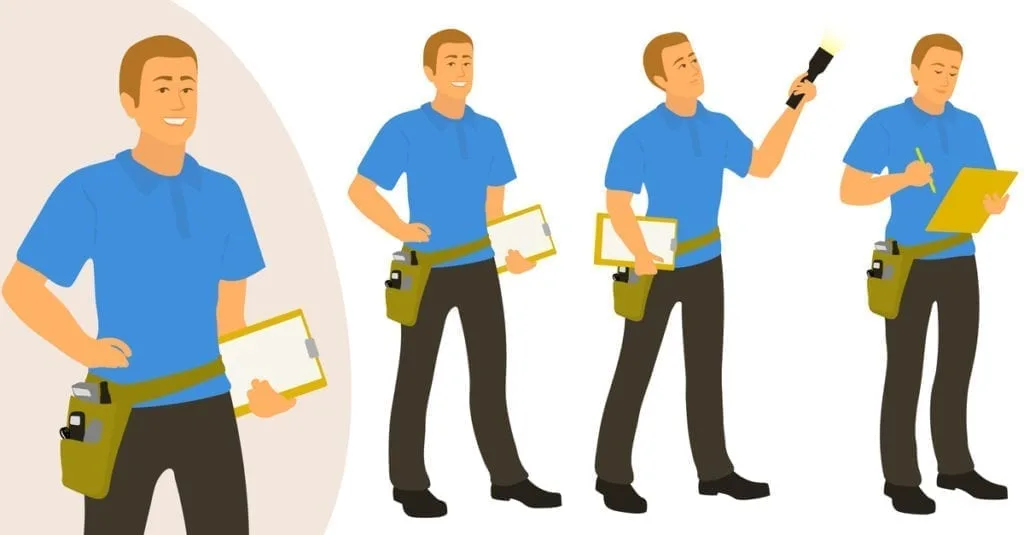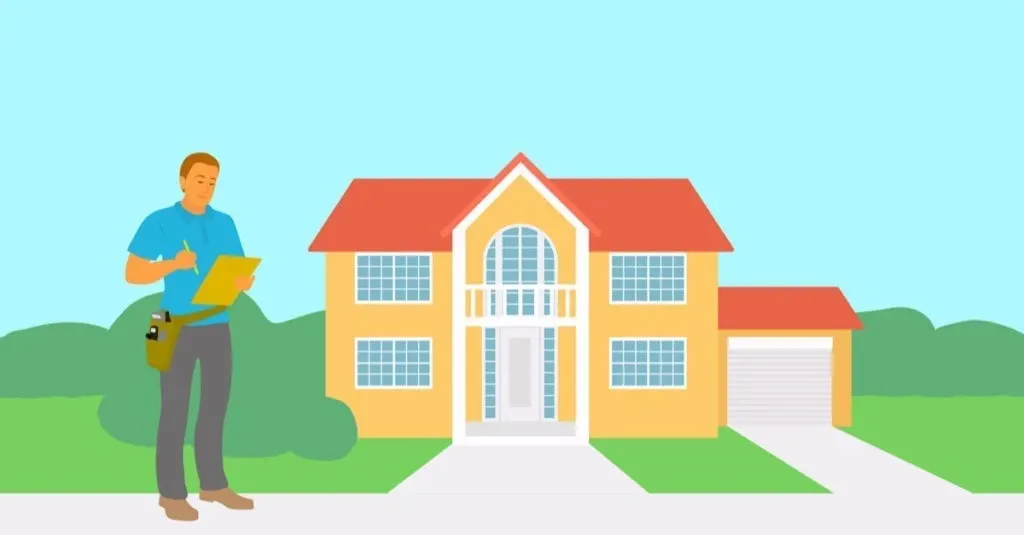If you’re here because you want to learn how to become a home inspector, you’re in luck.
Our complete guide covers job descriptions, salaries, and the daily life of an inspector. Read on to learn more.
What Is a Home Inspection?

Ulmi/Shutterstock
According to the American Society of Home Inspectors, 77 percent of homes sold in the U.S. and Canada are inspected before purchase. That means a career in home inspection is always in demand.
A certified home inspector will offer their professional opinion of a home for sale. They will conduct a visual evaluation and tests on the home’s systems and utilities.
These inspections are then used to determine whether a buyer will adjust their offer or if they’ll even proceed with the home purchase.
If you’re looking to get started in real estate or just switch careers, read on to learn how to become a home inspector.
Who Should Become an Home Inspector?
The home inspection profession is not for everyone. Not only does it require attention to detail, but you also have to be comfortable with different property types in any condition.
Necessary Qualities
- Has technical knowledge and is talented with problem solving.
- Interested and knowledgeable about construction and how homes operate.
- Able to work for themselves and manage their own time.
- Willing to learn and gain new skills.
- Organized.
- Outgoing and able to work with people. It is a customer-facing business, after all.
- I am not interested in having a traditional, nine-to-five desk job.
- Physically fit enough to climb ladders and duck through crawl spaces.
- Up for a challenge!
If this sounds like it describes you, read on! We’ve highlighted a typical work day, average compensation, and detailed steps on how to become a home inspector.
A Home Inspector’s Workday

Visual Generation/Shutterstock
Working with clients
Of course, home inspectors spend the majority of their time inspecting homes for buyers, but there is a lot more involved.
They must also write reports, consult with potential clients, and market their business to real estate agents and homebuyers.
Home inspectors can work with real estate agents or with buyers directly. One of those parties will call the home inspector, book an appointment, and agree on the home inspector’s fee.
Inspecting homes
The home inspector will send the client a contract, which they will sign ahead of time or at the time of the inspection. The inspection itself can be anywhere from two to four hours or even longer.
First, the inspector will examine the home’s exterior and garage. He will note the condition of the building, including any basement or attic areas, the roof, and the living spaces.
Diagnosing problems
While diagnosing the current state of the building, good inspectors also offer tips and expertise about how the buyer can maintain the home. This can be anything from what to do in an emergency to how to replace a furnace filter.
Reviewing reports
Then, the inspector will go over their findings with the client. This can be done in a written report created onsite. Or, the inspector can compile their findings and deliver an inspection report within 24 hours.
Either way, it must be done quickly so as not to slow the buying process for the client. Inspectors can do up to three inspections a day, but their schedules can depend on several factors.
The time of year (spring is much busier in real estate), the amount of work the inspector wants to take on, the strength of the real estate market, and the amount of marketing the inspector does.
Home Inspector Compensation
The typical inspection fee ranges from $300-$500, so hard-working home inspectors can make a comfortable living. The average home inspector salary in the U.S., according to the Bureau of Labor Statistics, is $58,000.
Of course, this can be more or less dependent on the area you live in. Home inspectors in Washington, D.C., earn an average of almost $79,000. In several West Coast states, salaries are near $90,000.
Even on the lower end, in more rural states, home inspectors can earn $30,000 to $50,000—a very livable income in their respective areas.
How to Become a Home Inspector

BlocBerry/Shutterstock
You know what a typical day looks like and what kind of skills you should have. You know you can make a good salary! If it sounds like a new career for you, we’ve detailed seven steps to becoming a home inspector below:
1. Determine your state’s licensing requirements
There is no federal standard for home inspectors, so licensing requirements vary widely by state. Some states, like California, Georgia, and Maine, do not require a license at all.
Some states require a high school diploma, and some require apprentice hours or a certain amount of continuing education hours. Here are a few examples:
- Arizona: 14 hours of continuing education in the first year and 80 hours of pre-licensing are required.
- California: Home inspectors are not state-regulated, but they are encouraged to follow the ethics of the ASHI and the California Real Estate Inspection Association.
- Florida: 120 hours from an approved training provider, and you must pass an exam.
- Illinois: You must be 21 or older and have a high school degree or GED. 60 hours of pre-license education.
- New York: high school diploma or GED and 140 hours of an approved education course. Must complete 100 paid or unpaid hours of home inspection with a licensed inspector.
As you can see, the requirements vary widely between very lax (or even not at all) and very stringent. Contact your state’s division of labor or licensing services for more information, and then proceed with your education and licensing from there.
2. Complete your home inspection education
Thankfully, there are lots of online courses and programs that offer inspector certification. We’ve detailed some of the most respected providers below:
- ATI Home Inspector Training considers itself a “business bootcamp.” The school is intended to foster life-skill development. They work to make home inspectors both certified and, importantly, qualified.
- They offer financial aid, and there is a lifetime association for alumni that offers a continuous resource, even after you’ve started your home inspection company.
- American Home Inspector Training is a national home inspection school that focuses on student support and success. It offers online courses as well as live courses in many areas. AHIT has more than 70 live training locations.
- Inspection Certification Associates offers lifetime access to the school’s database of e-books and reference materials. There are 28 streaming video training courses as well as instruction locations in your area.
3. Gain industry experience
Along with your training program, good home inspectors will work to expand their knowledge of construction and other industries. You can’t get this in an inspection course alone.
Work in a trade field like construction, plumbing, or carpentry, or offer to help as an apprentice for a short period of time.
While improving your general knowledge, doing this will also help with your people skills. This is important in your home inspection career since you have to be customer-facing.
4. Take your state’s home inspector license exam
If your state has licensing requirements, you may have to pass a licensing exam. Thankfully, the pre-licensing courses you completed will have prepared you for the test.
Plus, your school will be knowledgeable of your state’s education requirements and code of ethics.
They can also advise on the next steps. Even if you don’t have requirements in your state, it is still a good idea to take the National Home Inspector Examination (NHIE).
NHIE is an independent exam, so successful home inspectors can use the exam as a testament to their knowledge and credibility.
Many states use the NHIE for their licensing requirements. To prepare, you can purchase the NHIE study guide online or in your local bookstore.
5. Get liability insurance
Home inspectors need both Professional Liability and General Liability insurance.
Professional liability, or errors and omissions, insurance covers home inspectors if they miss something on the inspection. General liability will cover property damage claims or any third-party injuries.
6. Join a professional association
There are two main home inspection associations in the U.S. For a small fee, these groups provide knowledge and a steady resource for ongoing information and support.
Plus, these groups will alert you to changing trends and requirements in the home inspection and real estate industries. The two strongest and most reputable associations are:
- International Association of Certified Home Inspectors (InterNACHI)
- American Society of Home Inspectors (ASHI)
Marketing Your Home Inspection Business

Bloomicon/Shutterstock
You’re now a certified home inspector; congratulations! Now, you need clients. Successful home inspectors market to both real estate agents and consumers.
There are lots of ways you can market your business, and it’s important in today’s age to use several different kinds of marketing:
- Direct mail: Create a postcard or letter introducing yourself and your business, and mail it to all of the real estate agents in your area.
- Networking: Attend local events for real estate and even open houses! They will appreciate having more attendees, and it is an easy opportunity for you to introduce yourself and offer your services.
- Create a website: For those who aren’t professionals, chances are they are going to find you through Google. When they search “home inspector near me,” you want your business to come up! Create good descriptions and key words on your website, and register your business on Google and Yelp.
- Earn client reviews: You have your Yelp profile; now you need some reviews! After a job, encourage your clients to leave a positive review on Yelp. They will often do this if you ask nicely in a personal call or email. Or, offer a small incentive like a $5 Starbucks card for leaving a review. If your profile has any negative reviews, be sure to respond to them and address the problem. This shows your business is active and engaged in pleasing the customer.
- Social Media: Set up a Facebook business page and invite all of your friends to like your page. Fill in the About section so customers can use your Facebook as a source of information about your company and home inspections in general.
- Word of mouth: Good old-fashioned word of mouth is going to be one of the best ways to spread your business, so be sure to act professionally and ensure clients are satisfied at the end of each job.
Should You Become a Home Inspector?

UlMi/Shutterstock
Home inspection is a viable career in today’s real estate market. If you’re technically inclined and interested in working for yourself, it can be a lucrative career. Plus, you’ll enjoy flexible hours and the benefit of determining your own work load.
Successful home inspectors have completed applicable education, have practical knowledge of construction and home design, and keep up with industry trends. If this sounds like you, we’ve already shown you how to become a home inspector.
We think McKissock Learning is one of the best programs to use for your pre-license classes.
After all, you can take their classes from the comfort of your own home. Click the button below to learn about your own requirements and get started!

